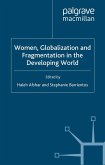Considerable social changes are underway as more women, particularly mothers, enter and remain in paid employment. The authors explore these changes (which include an increase in dual-earner families, declining fertility, and growing problems of work-life 'balance'), both comparatively and specifically in a number of European countries (Britain, France, The Netherlands, Finland, Norway, Sweden and Portugal). Original survey data, and qualitative evidence, is deployed in a series of cutting-edge chapters written by national and international experts.
Social changes including an increase in dual-earner families, declining fertility, and growing problems of work-life 'balance' are underway as more women, particularly mothers, enter and remain in paid employment. The authors explore this in a number of European countries (Britain, France, The Netherlands, Finland, Norway, Sweden and Portugal).
Social changes including an increase in dual-earner families, declining fertility, and growing problems of work-life 'balance' are underway as more women, particularly mothers, enter and remain in paid employment. The authors explore this in a number of European countries (Britain, France, The Netherlands, Finland, Norway, Sweden and Portugal).
'... as a smorgasbord of research on work, gender and family life, this table is tantalisingly laden.' - Gender in Management
'...this is a book that moves analysis and knowledge of the work/family balance forward. It is one that should be in the collection of specialists' - Mary Daly, British Journal of Industrial Relations
'...the methodological approach is rich: from original survey data to qualitative evidence; from macro cross-sectional trends to micro snapshots of experiences within specific employing organisations; from a focus on social policy to a focus on individual attitudes.' - INTAMS Journal for the Study of Marriage and Spirituality
'...this is a book that moves analysis and knowledge of the work/family balance forward. It is one that should be in the collection of specialists' - Mary Daly, British Journal of Industrial Relations
'...the methodological approach is rich: from original survey data to qualitative evidence; from macro cross-sectional trends to micro snapshots of experiences within specific employing organisations; from a focus on social policy to a focus on individual attitudes.' - INTAMS Journal for the Study of Marriage and Spirituality








